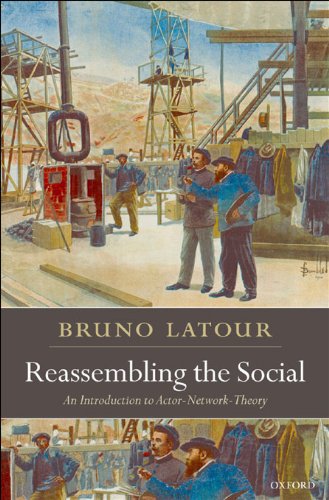10 Sociology Books That Shape Social Understanding
Recommended by Mark Zuckerberg, Bianca Belair, and Joe Feagin, these Sociology Books offer deep insights into social dynamics and theory.







What if the books you pick could reshape how you see society's deepest structures and spark fresh understanding about the world around you? Sociology, often seen as abstract, actually pulses with real stories and critical insights about power, identity, and connection. Now more than ever, with social tensions and transformations unfolding globally, exploring these dynamics isn't just academic—it's essential.
Take Mark Zuckerberg, who turned to Gang Leader for a Day to grasp urban social networks beyond digital realms, or Bianca Belair, who highlights The Mis-Education of the Negro as vital for understanding racial narratives in education. Meanwhile, Joe Feagin, a leading sociologist, praises The New Urban Sociology for illuminating the complex forces shaping our cities. Their endorsements come from firsthand engagement with these works—tools that challenge assumptions and deepen social awareness.
While these expert-curated books provide proven frameworks, you might seek content tailored to your background, interests, or goals. For that, consider creating a personalized Sociology book that builds on these insights, matching sociological knowledge to your unique journey.
by Vivek Chibber··You?
by Vivek Chibber··You?
Vivek Chibber challenges the conventional wisdom that culture alone can explain social dynamics by reviving a materialist perspective on class within contemporary sociology. Drawing on decades as a professor at New York University and his critical engagement with postcolonial theory, Chibber offers a nuanced framework that integrates cultural insights without losing sight of economic realities shaping class relations. You’ll explore how meanings and interpretations influence social agency while understanding the persistent power of class structures, with clear explanations that reconcile debates between cultural and materialist approaches. This book suits those interested in the intersections of culture, economics, and power, especially scholars and students navigating modern social theory.
Recommended by Christopher J. Hale
Tennessee politico and TIME contributor
“@BethJoslinRoth @PeteButtigieg @JonathanMetzl Great book!” (from X)
by Jonathan M. Metzl··You?
Jonathan M. Metzl's extensive career as a sociologist and psychiatrist deeply informs this investigation into how racial resentment shapes policies that ultimately harm the very white communities they pledge to protect. You’ll explore detailed case studies from Missouri, Tennessee, and Kansas, revealing how pro-gun legislation, healthcare resistance, and social service cuts correlate with rising mortality and educational decline. This book offers a nuanced look at the intersection of race, politics, and health, making it essential reading if you're seeking to understand the social dynamics fueling America's heartland struggles. While not a manual for change, it equips you with a clear-eyed perspective on the unintended consequences of certain political choices.
by TailoredRead AI·
This tailored book explores sociology with a focus that matches your background and interests, offering a personalized journey through social theory and practice. It examines foundational concepts such as social structures, institutions, and cultural dynamics while also delving into specialized areas selected to align with your goals. Through this approach, the book reveals how sociological perspectives illuminate real-world social interactions and systemic patterns, making complex ideas accessible and relevant. By addressing your specific learning needs, it creates a focused pathway that connects grand theories with everyday social phenomena, encouraging deeper understanding and critical thinking.
Recommended by Mark Zuckerberg
Co-Founder & CEO of Facebook
by Sudhir Venkatesh··You?
by Sudhir Venkatesh··You?
What if everything you knew about urban poverty was wrong? Sudhir Venkatesh, a sociology professor at Columbia University, spent nearly a decade embedded within a Chicago gang to reveal the complex social and economic workings of life in a notorious housing project. Through vivid accounts of his interactions with gang members, neighbors, and officials, you gain insight into the intricate networks of survival, power, and community that defy simplistic crime narratives. Chapters detailing the gang's business operations and community relations show the unexpected roles these groups play, making this an eye-opening read for anyone seeking a nuanced understanding of urban sociology beyond statistics and stereotypes.
Recommended by Booklist
“A great resource for those interested in or beginning the study of sociology.” (from Amazon)
by Sarah Tomley, Mitchell Hobbs, Megan Todd, Marcus Weeks, DK··You?
by Sarah Tomley, Mitchell Hobbs, Megan Todd, Marcus Weeks, DK··You?
Drawing from a background in philosophy, literature, and psychotherapy, Sarah Tomley and her co-authors craft a visually rich introduction to sociology that demystifies complex social theories. You'll explore over 80 key ideas from renowned sociologists through clear text, engaging charts, and timelines that break down topics like gender identity, inequality, and globalization. This book equips you with a strong foundational understanding of how societies organize and evolve, making it ideal whether you're new to sociology or seeking to refresh your knowledge. Its accessible approach means you won't get lost in jargon but will gain meaningful insights into the balance between individual needs and societal structures.
Recommended by Joe Feagin
Distinguished Professor, Texas A&M University
“Offering a critical sociospatial approach and global contextualization, The New Urban Sociology provides the best overall understanding of the development, spatial forms, and character of multicentered metropolitan areas available to students of U.S. urban development. These perceptive sociologists give central attention to multifaceted push-pull factors in metropolitan growth, center real estate actors’ role in structuring growth, assess multiple urban impacts of systemic racism, and connect the conflicts of diverse political coalitions in regularly shaping urbanization processes.” (from Amazon)
by Mark Gottdiener, Randolph Hohle, Colby King··You?
by Mark Gottdiener, Randolph Hohle, Colby King··You?
Mark Gottdiener, with over four decades as a sociology professor and a deep focus on urban and cultural studies, brings a nuanced lens to understanding metropolitan growth. This book breaks down how race, class, gender, and economics shape cities, blending social theory with real-world urban issues like public health and housing. You’ll find detailed explorations of sociospatial dynamics, including new chapters on social movements and marginalized communities, offering a solid framework for grasping the complexity of urban life. If you want to understand the forces behind city development and the social tensions within, this book offers clear insights without oversimplifying.
by TailoredRead AI·
by TailoredRead AI·
This tailored book explores urban sociology through a focused lens on city life and social networks, matching your background and specific goals. It reveals how social structures shape everyday urban experiences and examines patterns of interaction within diverse metropolitan environments. By concentrating on your interests, the book offers a personalized pathway through complex sociological concepts, connecting theory with observable urban phenomena. It covers themes from community dynamics to mobility and social capital, providing insights that resonate with your unique perspective. This personalized approach ensures the content reflects what matters most to you, making urban sociology accessible and immediately relevant for your learning journey.
Recommended by Bianca Belair
WWE wrestler and cultural influencer
“For #BHM I will be sharing some of my favorite books by Black Authors 23rd Book: The Mis-Education of the Negro -By Carter G. Woodson A MUST READ. Carter G. Woodson “the Father of Black History” created “Negro History Week” that was later expanded to Black History Month” (from X)
by Carter Godwin Woodson··You?
by Carter Godwin Woodson··You?
Carter Godwin Woodson's deep commitment to uncovering overlooked African-American history led him to write this enduring work, born from essays and speeches of the late 1920s. In it, you explore how education has been used to marginalize Black Americans, gaining a critical understanding of the systemic forces shaping knowledge and identity. The book offers insight into the roots of educational inequality and cultural misrepresentation, especially through chapters dissecting history curricula and societal narratives. If you're seeking to grasp the historical context behind race and education in America, this book provides a foundational perspective that challenges conventional views without glorifying or oversimplifying.
Recommended by Guy Kawasaki
Chief Evangelist at Canva, Author, Marketer
“PLEASE LISTEN to this podcast with Dr. Vivek Murthy, Surgeon General as he shares his research on loneliness from his book, Together: The Healing Power of Human Connection in a Sometimes Lonely World.” (from X)
by Vivek H Murthy M.D.··You?
by Vivek H Murthy M.D.··You?
The breakthrough moment came when Dr. Vivek H. Murthy, the 19th Surgeon General of the United States, spotlighted loneliness as a public health crisis demanding urgent attention. Drawing from his extensive medical background and personal experiences with loss and isolation, Murthy explores how human connection influences mental, emotional, and societal well-being. You’ll uncover practical strategies like dedicating focused daily time to loved ones, embracing solitude for self-awareness, and engaging in community service to rebuild bonds. This book benefits anyone feeling disconnected—whether you’re navigating workplace challenges, parenting, or societal divisions—by offering insights into forging meaningful relationships that impact health and happiness.
by Bruno Latour··You?
by Bruno Latour··You?
What started as a deep questioning of how "the social" is traditionally understood became Bruno Latour's challenge to the foundations of social science. Latour argues that the term "social" has been stretched to misleading extremes—sometimes treated as a fixed material or a set of stable ties, rather than a dynamic process of assembling. Through this book, you gain insight into Actor-Network-Theory, which reframes social phenomena as networks of associations, blending human and nonhuman actors alike. For anyone drawn to social theory, this book offers a fresh lens to reconsider society beyond conventional categories, especially through chapters that dissect the assumptions embedded in social explanations.
Recommended by Peter Kivisto
Sociology professor at Augustana College
“Royce has produced an erudite and highly readable book designed to introduce student readers to the three most important formative figures of modern sociology: Karl Marx, Emile Durkheim, and Max Weber. His command of the relevant literature is impressive, as is his ability to convey complex ideas in a comprehensible was for the intended audience. The book does an excellent job of revealing the contemporary relevance of this trio of thinkers by linking their work to four major themes: the modern condition, the fate of the individual, state and democracy, and socialism and capitalism. By concluding with the last of these themes, Royce points to the role of the sociological imaginary in envisioning an alternative world where greater social justice and equality prevails.” (from Amazon)
by Edward Royce Rollins College··You?
by Edward Royce Rollins College··You?
Edward Royce, a seasoned sociology professor emeritus at Rollins College, developed this book to illuminate the foundational theories of Marx, Durkheim, and Weber and their ongoing relevance in modern society. You gain a structured understanding of their key ideas framed within the transformative contexts of the Enlightenment, the French and Industrial Revolutions. The book dives into their perspectives on pressing societal themes like modernity’s pathologies, individual struggles, state power, and economic systems, encouraging you to critically engage with conflicting viewpoints. This approach suits students and anyone aiming to grasp the classical roots underpinning contemporary sociological thought without unnecessary jargon.
Recommended by Jason Stanley
Philosophy professor at Yale
“@fran_adkins No, a lot of them actually think they are intellectually superior. And they do so because it’s Black authors and Black history, so of course they must be. Aldon Morris wrote a great book on how great Black intellectuals get treated.” (from X)
After a decade of meticulous research, Aldon Morris challenges the established narrative of sociology's origins by spotlighting W. E. B. Du Bois's foundational role. The book details how Du Bois developed rigorous scientific methodologies across multiple chapters, particularly emphasizing his innovative approaches to race and social inequality. You’ll gain insight into the political and academic forces that sidelined Du Bois’s contributions while illuminating the complex interplay between sociology and racial politics. This work suits anyone interested in American intellectual history, racial justice, and the evolution of social sciences but may be less engaging for readers seeking introductory sociology concepts.
Get Your Personal Sociology Guide in 10 Minutes ✨
Stop sifting through endless books. Get focused Sociology insights tailored just for you.
Trusted by sociology enthusiasts and experts worldwide
Conclusion
This curated collection reveals several key threads: the enduring relevance of classical sociological theory, the urgent need to address racial and educational inequalities, and the evolving understanding of social networks in urban and digital contexts. If your challenge lies in unpacking systemic injustice, starting with The Scholar Denied and Dying of Whiteness offers critical perspectives. For rapid immersion into social structures and connection, pairing The Sociology Book with Together provides a practical and emotional roadmap.
These books aren’t isolated texts but parts of a broader conversation about society’s fabric. Alternatively, you can create a personalized Sociology book to bridge the gap between general principles and your specific situation. Whether for academic, professional, or personal growth, these sociology books can accelerate your understanding of society’s complexities and your place within it.
Frequently Asked Questions
I'm overwhelmed by choice – which book should I start with?
Start with The Sociology Book for a clear, accessible overview of key concepts. It lays a solid foundation before diving into more specialized works like Gang Leader for a Day or The Mis-Education of the Negro. This approach builds your understanding step-by-step without feeling lost.
Are these books too advanced for someone new to Sociology?
Not at all. While some delve into complex theory, several like The Sociology Book and Together are designed to be approachable. They introduce ideas in straightforward language, making sociology engaging even if you’re just starting out.
What's the best order to read these books?
Begin with broader introductions like The Sociology Book and Classical Social Theory and Modern Society. Then explore focused topics like urban sociology (Gang Leader for a Day, The New Urban Sociology) and racial studies (The Scholar Denied, The Mis-Education of the Negro). Finally, dive into social theory innovations with Reassembling the Social.
Are any of these books outdated given how fast Sociology changes?
These selections balance classic and contemporary perspectives. For example, Classical Social Theory covers timeless thinkers, while The Class Matrix and Dying of Whiteness engage with current social issues. Together they provide a well-rounded, timely sociological view.
Which book gives the most actionable advice I can use right away?
Together offers practical strategies to build social connections that impact wellbeing daily. For urban social dynamics, Gang Leader for a Day reveals real-world insights that can inform community engagement and policy thinking.
How can personalized Sociology books complement these expert recommendations?
Personalized books tailor sociological insights to your background and goals, building on the expert works listed here. They help translate broad theory into actionable knowledge specific to your context. Explore this option at create a personalized Sociology book.
📚 Love this book list?
Help fellow book lovers discover great books, share this curated list with others!
Related Articles You May Like
Explore more curated book recommendations









